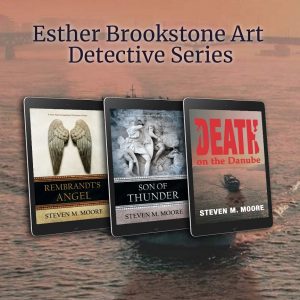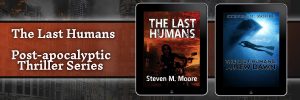My experiences with traditional publishing…
Where am I in my publishing career? By now, I’ve tried just about everything that there is to try, so I will state my conclusion at this point: I’ll never feel comfortable again recommending that an author try a traditional publisher and all that entails! While a small press (also called an indie publisher, not to be confused with an indie writer aka self-published author) can give an author some TLC that’s rarely found with one of the Big Five publishing conglomerate’s cadre of publishers, there’s just not enough of that TLC to make traditional publishing attractive compared to self-publishing. Authors have a choice, of course, and I give both options their due in my little course “Writing Fiction” (a free PDF download found on my “Free Stuff & Contests” web page), but my opinions have evolved along with that little course (now in its ninth revision).
Let’s start with traditional publishing’s agents and acquisition editors. The first are found mostly pandering to the Big Five, i.e. mostly pariahs that work for the big publishers, and they screen manuscripts for them that they’ve determined will sell well in book form. Neither they nor acquisition editors can predict a book’s success, though; many authors have proven that—Tom Clancy, J. K. Rowling, E. L. James, and Mark Weir are only some examples of authors overlooked by these pariahs ab initio. A more critical assessment is needed, though: They don’t really favor literary art and look more for immediate profit, which is why readers see too much romance, erotica, and other fluff, political scandal, and pols and celebs’ bios about their escapades flooding the market, burying good storytelling and good non-fiction in a lot of noise.
I’ll admit my experience with these agents and acquisition editors hasn’t been a happy one, although I had no real complaints about the acquisition editors of my two small presses, Black Opal Books (the original acquisition editor!) and Penmore Press. (Emphasis on “small” here; ‘big” is bad.) Both of these companies were initially run by authors (Penmore still is) and had a strong catalog of interesting novels when I first approached them, so they seemed like a good home for my books, traditional publishers that would provide me a place to experiment a bit with traditional publishing.
 However, bad things happen to good small presses that authors can’t predict early on. Wanting to have that full publishing experience, though, I first tried Penmore Press. I’d reviewed a book or two from them in my “official reviewing capacity” at Bookpleasures.com—let’s say they were in the mystery/thriller category, so I submitted the manuscript of my mystery/thriller Rembrandt’s Angel to them. From my point of view, that went well enough, and the book got some very nice reviews. I continued with Son of Thunder, also in the “Esther Brookstone Art Detective” series (Penmore actually came up with the name of the series, which has grown on me), but that second novel didn’t go so well. The first editor loved the book, but a second one insisted on making excessive changes to the content in the first few chapters (always critical in a long novel) to the point that it was written in that editor’s style, not Steve Moore’s (that’s always a danger with editors!). The third book, Death on the Danube, was the straw that broke the camel’s back: Penmore told me that they were willing to make the series a trilogy only if I paid the upfront costs! One of the few advantages of going traditional and partially justifying that the publisher take the lion’s share of the royalties (generally 80 to 85 percent!) is that those upfront costs are paid by the publishers (just a good cover can be costly). I said goodbye to Penmore for the third book in the series and later ones (the series is now seven novels strong).
However, bad things happen to good small presses that authors can’t predict early on. Wanting to have that full publishing experience, though, I first tried Penmore Press. I’d reviewed a book or two from them in my “official reviewing capacity” at Bookpleasures.com—let’s say they were in the mystery/thriller category, so I submitted the manuscript of my mystery/thriller Rembrandt’s Angel to them. From my point of view, that went well enough, and the book got some very nice reviews. I continued with Son of Thunder, also in the “Esther Brookstone Art Detective” series (Penmore actually came up with the name of the series, which has grown on me), but that second novel didn’t go so well. The first editor loved the book, but a second one insisted on making excessive changes to the content in the first few chapters (always critical in a long novel) to the point that it was written in that editor’s style, not Steve Moore’s (that’s always a danger with editors!). The third book, Death on the Danube, was the straw that broke the camel’s back: Penmore told me that they were willing to make the series a trilogy only if I paid the upfront costs! One of the few advantages of going traditional and partially justifying that the publisher take the lion’s share of the royalties (generally 80 to 85 percent!) is that those upfront costs are paid by the publishers (just a good cover can be costly). I said goodbye to Penmore for the third book in the series and later ones (the series is now seven novels strong).
 Black Opal Books was even a worse experience. The Last Humans was the first book in a planned post-apocalyptic trilogy. I couldn’t go with Penmore because they didn’t do sci-fi (post-apocalyptic is considered sci-fi), so Black Opal seemed a good substitute. Again I’d reviewed some of their books and they had an extensive catalog. The acquisition editor loved the novel, but again, the second editor, not so much. She pounded me with her rigid adherence to the Chicago Manual of Style, a rigid anachronism no author can afford to buy, a vicious attack on my prose that all but destroyed my voice (actually Penny Castro’s, since the novel is written in first person). And again, despite that editor’s attack, the book was moderately successful, with many good reviews and even a prize from Readers Favorite (a video trailer offer which I used to promote Death on the Danube, the third book in the “Esther Brookstone” series, because I didn’t want to waste that prize promoting a book for Black Opal for reasons I now mention–see the link on my “Home” page).
Black Opal Books was even a worse experience. The Last Humans was the first book in a planned post-apocalyptic trilogy. I couldn’t go with Penmore because they didn’t do sci-fi (post-apocalyptic is considered sci-fi), so Black Opal seemed a good substitute. Again I’d reviewed some of their books and they had an extensive catalog. The acquisition editor loved the novel, but again, the second editor, not so much. She pounded me with her rigid adherence to the Chicago Manual of Style, a rigid anachronism no author can afford to buy, a vicious attack on my prose that all but destroyed my voice (actually Penny Castro’s, since the novel is written in first person). And again, despite that editor’s attack, the book was moderately successful, with many good reviews and even a prize from Readers Favorite (a video trailer offer which I used to promote Death on the Danube, the third book in the “Esther Brookstone” series, because I didn’t want to waste that prize promoting a book for Black Opal for reasons I now mention–see the link on my “Home” page).
Unfortunately, Black Opal Books was bought out and suffered a disastrous reorg that has ruined this small press and been prejudicial for all its authors! (There are some who don’t realize this!) I’d already submitted the second book in the series, The Last Humans: A New Dawn, and the new owners sat on it for over a year after agreeing to publish it, so I withdrew it and self-published the book myself (as I’d done for Death on the Danube). The latest egregious action from this small press was sending me a royalties check that bounced, losing those royalties plus bank penalties for a bounced check, and, what’s more, sending a 1099 to the IRS I now have to declare even though I never received the royalties!
Given all the options for self-publishing that authors now have, my personal experience with traditional publishing leads me to conclude that authors should avoid it at all costs! Traditional publishing puts an author in the awful situation of a peon in the service of a feudal lord, working his butt off for basically nothing while that scurrilous lord gets rich! Their mental and physical health is likely to be in danger as well! It’s just not worth wasting the time with a traditional publisher. An author is in charge with self-publishing and can spend their time better. I’d much rather have more time for my storytelling!
***
Comments are always welcome! (Please follow the rules on the “Join the Conversation” web page.)
“Writing Fiction.” Many of these experiences summarized above and more are related in more detail in this little course available as a free PDF download (see the “Free Stuff & Contests” web page). I cover the various options for authors to publish their books as well as what needs to be done at each stage of the game. It provides a valuable counterpoint to all the schlock authors might see in books offered by “writing gurus” and other so-called “experts,” honest opinions albeit often acerbic about what might work for authors in their writing careers. And this course has another advantage over those experts’ books: It’s free!
Around the world and to the stars! In libris librtas!
